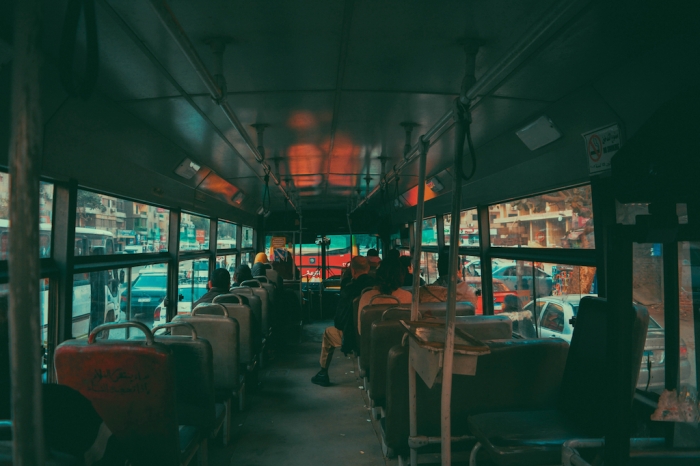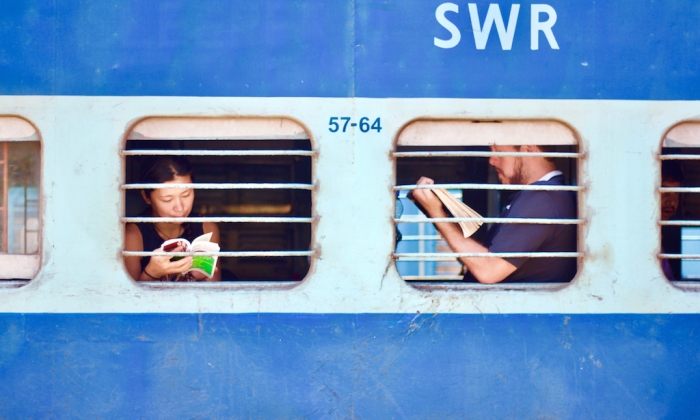It’s sometime after two in the morning. You’re in the middle of nowhere somewhere up in the mountains and the minibus hasn’t moved for an hour. You’re perched on the edge of a worn and holed back seat that was designed for four people but which now somehow accommodates six, and the passenger next to you has fallen asleep with his head on your shoulder.
There are no lights outside or inside the bus and all you can see is the orange glow of the cigarette that the passenger on the other side of you has just lit. You can almost feel his smoke wafting over you in the darkness, tickling your throat and making you cough. Nobody seems to have any idea why the bus has stopped or when it will move again. Maybe the driver said something before he disappeared into the night about half an hour ago but you don’t understand the local language so you have no option but to sit patiently in the dark and the smoke and wait. The journey was already supposed to take twelve hours but now you have no way of knowing what time you will eventually arrive. All you keep thinking to yourself is, why didn’t I just fly?
Travelling on local transport can turn into a time-consuming ordeal. Sometimes the skills of drivers can be eccentric at best and journeys can be so terrifying, they leave you covering your eyes with your hands and praying that you will arrive in one piece. Ancient vehicles end up being packed full with both human and non-human passengers and you may find yourself stepping over poultry on the floor to reach your seat or listening to squealing pigs or bleating goats fastened to the roof. You never know if the person sitting next to you is going to turn out to be a chain smoker or if they will spend the whole journey vomiting into a bag from the moment you pull out of the station. You don’t dare to hope for a good night’s sleep, preparing yourself instead for blaring music blasted through powerful speakers all night in an attempt to prevent the driver from falling asleep at the wheel.

Take time to cook, take time to travel
In the fast-paced modern world where everything is mass-produced, packaged and sold ready to consume, much of our travel has become like a microwave ready-meal, pre-prepared and easy. We tear off the wrapping, pop it in the oven and it’s ready to eat; we don’t care about the ingredients or how it’s made, it’s just a quick dinner with no fuss and no effort that we can spoon into our mouths for maximum satisfaction in the shortest amount of time. We have no intention and no inclination to spend hours chopping, pounding, stirring or mixing: we’re hungry, we just want the end product and we have no time to wait.
Yet as anyone who cooks will tell you, the pleasure of preparing a meal is precisely in those hours spent scouring the markets for the freshest ingredients, the effort of cutting the meat and washing the vegetables, the sound of the garlic sizzling as you throw it into a pan of hot oil and the mouth-watering smells that fill your kitchen as you add the ingredients one by one. The most important part is the process, not the result, and the time you put in only makes the final dish taste more delicious. It is exactly the same when we travel.
When we fly, we gain so much in convenience, speed and efficiency but we also lose some of the essences of what it really is to travel. We step through the door onto the plane, we place our luggage in the overhead compartment, we recline our chairs and have a nap, read or watch a film and suddenly, only a few short hours later, we emerge through the same door on the other side of the planet.
We have no appreciation of the distances we cover and we know nothing of the lands or people that race by several miles beneath our feet.
If you take the time to travel overland, you can see for yourself how the geography and the climate change gradually. Taking a seat on a train in Hong Kong, you can gaze out of the window as the humid subtropical landscapes of the southern provinces of China morph imperceptibly into the watery scenery of Zhejiang and Jiangsu. As the train continues north, the terrain gradually becomes more arid and the vegetation changes again. The rice paddies become fields of wheat and the great drooping bamboos of the south are replaced by hardier and less thirsty species of flora as you begin to draw closer to Beijing and the north.
In Moscow, if you take your place on a train heading east, the great expanses of the Russian interior will roll past your window day after day as the train passes through different time zones, slowly crawling its way across Siberia toward the coast. You begin to comprehend the vastness of the distances you are covering, and the awesome scale of the continent you are crossing makes you feel small and insignificant. Faced by the immensity of nature, the sensation is humbling.

Make friends, make stories
When we travel, one of the things we crave above all is discovery. The places we visit cannot be separated from the people who live there and it is not possible to learn about a country without interacting with the locals. However, the most popular tourist destinations have all been irreversibly changed by mass tourism and the locals are mainly interested in thinking up various ways of separating visitors from their cash. Everyone seems to be a taxi driver, a tour guide or a guesthouse owner and every conversation returns in the end to what they can sell you.
If you really want to meet the locals, you need to leave the tourist trail and there is no better way to do it than by taking local transport. You will have the chance to interact with people who are genuinely interested in you and sometimes who may never even have spoken to a foreigner before. Communication may require determination as you may have no common language but the problem is never insurmountable and you will often finish a journey with many new friends and cherished memories.
Travelling the long way can be trying. Faced with incomprehensible timetables, idiosyncratic driving practices or the lack of any notion of comfort, local transport can test anyone’s patience to the limit. You don’t need to take a kind of perverse masochistic pleasure in enduring uncomfortable hours in the back of a minibus which probably isn’t even roadworthy; but like when we take the time to cook a special meal, persevering means we appreciate the reward more at the end. The beach seems more beautiful and the sea more refreshing when we finally arrive.
We lose the sense of adventure when we fly. Travellers are all storytellers and here’s one of mine. During an Indian holiday when almost all transport to anywhere in the country was fully booked, I needed to travel from Pondicherry to Puri via whatever trains, buses or rickshaws were available. On the way, I found myself stuffed into an ‘unreserved’ carriage that was so dangerously overcrowded that people were lying in the baggage racks, squatting on the top of the door, squashed into the toilet and squeezed into the smallest spaces imaginable. Later, in the middle of the night, I boarded another train in the wrong direction and had to practically fight my way to the door at the next stop as people were pushing to board. A day later, on a night bus, I was woken at seven in the morning by the sound of Tamil music at full volume as the day’s loop of films began when I had barely managed to snooze all night.
Over 48 hours after setting off, in the early hours of the morning I pulled into Puri station on yet another train filled with farm labourers returning from the fields. I stumbled through the streets in a daze in search of a guesthouse where I could finally, gratefully, fall asleep in a bed. It was the most arduous journey I have ever undertaken but I still remember every detail, even now, over eight years later. Journeys like these can be excruciating at the time but it certainly makes a much better story than telling how you bought a first-class ticket and arrived uneventfully at your destination a few comfortable hours later. How many plane journeys can you remember from eight years ago?
Travel is about the journey, not the destination
Travellers sometimes try to distinguish themselves from ‘tourists’ although in reality the distinction is blurred. Maybe the difference is this: a tourist is focused on the destination whereas a traveller is more concerned with what happens on the road.
In today’s high-speed world, travelling overland or by sea teaches us patience and encourages us to slow down and take notice of the things that otherwise we might miss. We see the authentic spaces in between the manufactured and packaged tourist destinations that everyone rushes to visit and we meet real people along the way. It is an antidote to the modern world where everything happens so fast and everything must be available instantly. Travelling could both be considered a kind of metaphor for life: it was the Buddha who supposedly said, “it is better to travel well than to arrive”.
For when you arrive at your destination, the journey is over.




